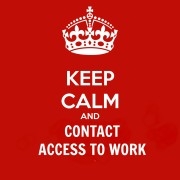Lipspeaker v lipreader: A literary adventure
Guest author: Deaflinguist
A fortnight ago I went to a conference in my academic field and definitely needed communication support for an intensive day of quite high-powered lecturing which was a challenge for my lipspeaker on several counts, not least that few of the speakers gave her any material to prepare, some had English as a second language, and others just spoke terrifically rapidly and had to be forcibly slowed down.
My lipspeaker was working solo since the other booked lipspeaker was ill, and she admitted to feeling as if she was struggling in the circumstances: however, she betrayed no sign of it and carried on as a true professional. We talked it over and came to the conclusion that because I was familiar with the field I could fill in the gaps from my own knowledge and supplement it with what I could hear. I think it helped as well being someone who was used to receiving communication support, and thus having an understanding of how it works and reasonable expectations.
The following week I went to a former colleague’s book launch in a church in Bristol as a social occasion, just with the Bear, who also knows him. Our friend gave a speech for 20 minutes which I followed in its entirety. OK, I knew the speaker, and had some idea of the subject, since we have a common background. Yet even with those advantages, I wouldn’t have been able to follow in the past by lipreading alone.
Thus emboldened, I dragged the Bear along to a local library a few days later, when I found out that an author of well-received historical fiction, based on his own researches which have overlapped with my own, was speaking. I’d never met him before so this was ratcheting it up a notch. Off we trotted and everything was in my favour – we were the first to arrive so had our choice of seats; small venue; nice bright lights which were not dimmed for the talk; a cleverly illustrated PowerPoint presentation; a clear speaker who was used to public speaking and thus spoke without hesitation, digressions, or backtracking on himself; and a manageable 45 minutes.
Again, perhaps, some prior knowledge helped me on my way, but I understood everything he said, apart from one or two occasions when he did put his hand to his mouth as he mused on something. However, I quickly picked up the thread again. Where I had some difficulty was in understanding the questions at the end, but the Bear repeated them for me and I was able to follow the answers. The issues, of course, lay in not seeing the speakers behind me (as I was sitting at the front), in the rather more random order of the questions, and in the demographic, of older people, the register of whose voices can sometimes have less clarity.
That week concluded with me giving a lecture to an audience of mostly older people. I knew that this would be a largish audience and that a certain number would, themselves, have age-related loss and be hearing-aid wearers, but would not request communication support, necessarily. We had a small venue with good acoustics which I requested specifically, no competing or intrusive noise, good lighting, and so on – all the things which worked for me the other way round as an audience member.
One of the things that I do as a speaker is to make the audience laugh a little bit every now and then – it’s not necessarily for entertainment value, to put them at their ease, or give them something memorable that will stick in their mind from the talk, although those are good things to do, but simply because it is a subtle way of checking that they’ve understood. If they all laugh together – they’ve got you.
For this audience, I requested a sign language interpreter as it is the unwritten law of presentations that the person who asks the most avid questions will be the mumbler with the beard at the back, and I won’t have a hope of understanding them. It’s less critical when I’m part of the audience myself. As a professional, though, it is crucial to comprehend questions correctly in order to answer them, but it is also important to put the audience at their ease, particularly with that demographic who may feel less confident about repeating their question if it isn’t understood first time. It went seamlessly and I was pleased that I had pitched the situation absolutely correctly and not gone swimming solo out of my depth.
The moral of the story is: don’t be afraid to stretch your boundaries with a cochlear implant and try new things, and the second moral is that it is always worth reviewing your communication needs, not only pre- and post-cochlear implant, but also for specific situations.











Leave a Reply
Want to join the discussion?Feel free to contribute!